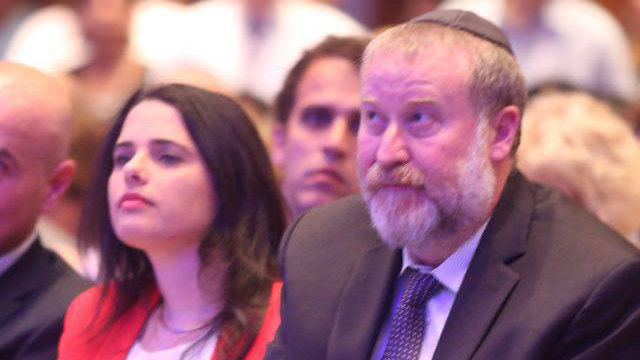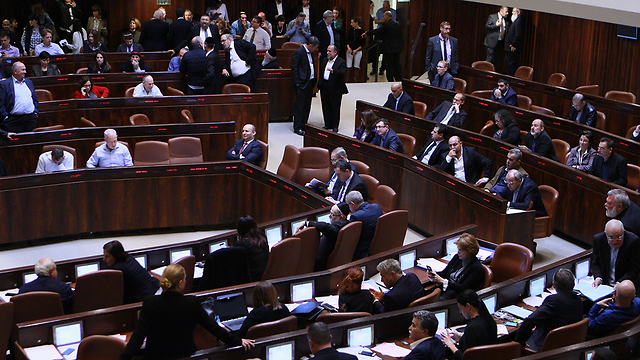
The AG’s war to protect Israeli democracy
Analysis: The Regulation Law has created one of the most serious constitutional crises the State of Israel has ever experienced. Attorney General Mandelblit, who strongly opposed the law, sees himself as being at the forefront of the battle against the attempt to change basic principles in the state’s democracy and in the independence of its elected institutions.
It was no coincidence. The Judicial Selection Committee will convene at the end of the month in a bid to reach understandings on the four candidates who will join the Supreme Court panel. The selection of the four judges, the adoption of a controversial key law—against the attorney general’s stance – and challenging the law at the High Court, announce a flare-up concerning the existing order and the roots of democracy.

Since the establishment of the current Netanyahu government, which has raised the banner of “regulating” the illegal settlements at all costs, petitions to bleach or to evacuate the settlements are being discussed every now and then. Meanwhile, calls are always being made to impact the Supreme Court’s authority by changing the panel of judges, changing the way the selection committee works and reducing the ability to fil a legal claim (“standing”).
After the attacks on the legal system throughout the Amona affair, “now comes one of the key petitions, which no longer deals with one land or another but with the father of all laws—the Regulation Law of the settlement enterprise,” says a senior legal source. Two weeks ago, for example, in the middle of the Amona evacuation operation, a High Court ruling by a two-to-one majority slipped beneath the radar. The ruling cancelled a legal construction invented by Attorney General Avichai Mandelblit for the purpose of a temporary and alternative community for the Amona evictees. Justice Minister Ayelet Shaked, the engine behind all the regulations, reamained undaunted. The legal echelon, she said, was armed with alternative formulas from the area of administrative law. The “market ouvert” and the “presumption of community property” are examples of the legal pyrotechnics used for legitimizations which only knowledgeable people understand.
Disregard of basic principles
Attorney General Mandelblit immediately detected the seeds of evil. At the very beginning, he already announced his objection to the Regulation Bill and pleaded with members of the Ministerial Committee for Legislation not to take part in it. “They looked him in the eye and failed to adopt his recommendation,” says a source who was present at the meeting.
In order to smooth down the pill, and for fear of bloodshed during the Amona evacuation, he tried to come up with alternative solutions. His critics argue that he is trying too hard. His defenders say he is attempting to lower the flames.
Mandelblit sees himself today, together with the Supreme Court, as being at the forefront of the battle against the attempt to change basic principles in the state’s democracy and in the independence of its elected institutions, including the institution headed by him. And there is also a legal-international system which he will have to answer to. Sources in the State Attorney’s Office say that during meetings on the Regulation Law, Mandelblit said he was working not only to help implement the policy within the boundaries of the law, but also to represent the rule of law in the State of Israel.
Former Supreme Court president Dorit Beinisch said last Monday, on the eve of the Regulation Law’s approval: “It’s hard to imagine that a state would consider expropriating residents’ private land in a seized territory. Legislation against private property contradicts the principles of Israeli and international law. There has never been any legislation regarding land that is not included in the State of Israel’s jurisdiction. The Knesset and the government are adopting a move that disregards our constitutional basic principles.”
“This time, it’s not just a battle over another law,” adds a retired Supreme Court judge. “We are talking about a symbol here—will the Supreme Court remain independent, or will it be defeated by the threat of the majority in the Knesset which enacted a law concerning a substantial change in the 50-year control of the territories. We are talking about the Supreme Court, which has rescued the state from itself in the internal and international arena more than once, with the help of its enlightened rulings, while the storm raged around it, and in return always suffered from de-legitimization.”
According to the former justice, “The absurdity is even greater. The Supreme Court’s ruling on the law’s constitutionality will largely define the extent of the defense Israel will have in the international legal arena. Mandelblit warned in the cabinet meetings discussion the law’s ramifications, and Prime Minister Netanyahu agreed, that this law brings Israel closer to being charged with war crimes at the International Criminal Court in The Hague.”
In this context, quite a few legal experts were surprised by Mandelblit’s announcement, through Minister Shaked, that he would allow the government to seek private representation at the High Court. It has always been agreed that the attorney general is the law’s exclusive interpreter until it reaches the High Court. Mandelblit himself said so very well at a recent conference in Zichron Yaakov: “In the Israeli legal system, the authority to determine what is the right interpretation of the law for the government officials, and what are the legal boundaries they are authorized to operate within, is in the hands of one person only, as long as the court has not ruled otherwise—the attorney general in the State of Israel.”
Sources in the Justice Ministry, however, say that although Mandelblit will not defend the law, “it’s important for him to continue his full cooperation with the government in a businesslike manner. After all, the Knesset which adopted the law is the sovereign and it is entitled to representation, as is the government’s stance, despite being wrong.”
Threatening the selection process
In the pages of history there are impressive refusals to defend illegal or unconstitutional government stances. Yitzhak Zamir was removed from his position as attorney general in 1986 for refusing to defend the pardoning in the Bus 300 affair. Legendary State Attorney Dorit Beinisch refused to defend late Prime Minister Yitzhak Rabin when he refused to fire ministers Deri and Pinhasi from the government following indictments filed against them. The High Court, by the way, in all petitions of this kind, backed the independence of the attorney general’s discretion and the exclusivity of the AG’s representation.
In any event, it is already clear that an expanded panel of Supreme Court judges which is expected to discuss the case will summon the attorney general, or will at least ask for his written opinion.
And if that were not enough, the Judicial Selection Committee is expected to convene in two weeks for the appointment of four Supreme Court judges—about one-quarter of the panel. Despite the talks being held between Chief Justice Miriam Naor, Justice Minister Shaked and President of the Israel Bar Association Adv. Efi Nave, agreements have yet to be reached, although some of the gaps have been bridged and the list now includes eight candidates.
The selection process is already being threatened. In the past few months, in order to hush her critics in the Right over the High Court’s rulings, Minister Shaked has reiterated her promise that the selection of Supreme Court judges would be dominated by conservative judges—a code name for judges who “won’t intervene in the Knesset and government decisions.” Political sources in the committee are already warned that if no agreements are reached, Shaked will pull her objection to MK Robert Ilatov’s bill to cancel the law requiring a majority of seven out of nine committee members. In such a case, Shaked and her political partners will easily select four conservative judges and change the High Court’s future rulings unrecognizably.











